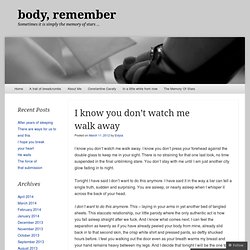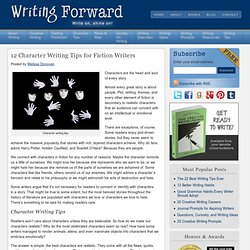

I know you don't watch me walk away. I know you don’t watch me walk away.

I know you don’t press your forehead against the double glass to keep me in your sight. There is no straining for that one last look, no time suspended in the final unblinking stare. You don’t stay with me until I am just another city glow fading in to night. Tonight I have said I don’t want to do this anymore. I have said it in the way a liar can tell a single truth, sudden and surprising. I don’t want to do this anymore. I have held on to you so long that my hands still clench around you. I move to the edge of the bed and I tell you I am leaving.
I know you don’t get up after I close the door behind me. It is my 35th birthday and I will not cry. Image by Joanne Piechota Author’s update – November 2012: Jo recently created a visual essay inspired by the above piece; for more information on I know you don’t watch me walk away (imagined) click here. Like this: Like Loading... Archetype: The Fiction Writer's Guide to Psychology. A. Victoria Mixon, Editor. Unmissable articles on writing. 4 Reasons You Should Do NaNoWriMo … and 4 Reasons You Shouldn’t. If you read blogs about writing, or follow writers on Twitter, there’s a good chance you’ve heard the word “NaNoWriMo” recently.

In case not – NaNoWriMo is short for “National Novel Writing Month”. It takes place every November, where writers all over the world (256,618 last year) aim to write a 50,000 word novel in just 30 days. Maybe that sounds crazy to you. Maybe it sounds like an exciting challenge. Either way, NaNoWriMo – or NaNo – is definitely worth thinking about. Although some writers are evangelical about NaNo, and others are scathing, I fall somewhere in the middle. So here are four reasons why you should jump on the NaNo bandwagon … and four reasons why you shouldn’t. Why You Should… #1: You Want to Build a Great Writing Habit If you haven’t been writing much recently, or if you struggle to be consistent with your writing, NaNoWriMo is a great opportunity to establish a strong writing habit. #2: You Want to Make Serious Progress on a Big Project #3: You Want to Meet Other Writers.
Internet Resources - Writers Resources - Writing Links & Writers Links for Writers. Unsorted [/writers] James Patrick Kelly - Murder Your Darlings - "When time comes to make that final revision, however, you must harden your heart, sharpen the ax and murder your darlings.

" Greda Vaso - Determining the Readability of a Book - includes formulas for Gunning's Fog Index, Flesch Formula, Powers Sumner Kearl L. Kip Wheeler - Literary Terms and Definitions L. Kip Wheeler - Comp - Lit - Poetry - Links - more Style - Grammar - Errors in English [/writers]American Heritage - Book of English Usage - free download Band-Aid AP StylebookPaul Brians - Common Errors in EnglishCJ Cherryh - Writerisms and other Sins The Chicago Manual of Style FAQ Gary N. 12 Character Writing Tips for Fiction Writers. Character writing tips.

Characters are the heart and soul of every story. Almost every great story is about people. Plot, setting, themes, and every other element of fiction is secondary to realistic characters that an audience can connect with on an intellectual or emotional level. There are exceptions, of course. Some readers enjoy plot-driven stories, but they never seem to achieve the massive popularity that stories with rich, layered characters achieve. We connect with characters in fiction for any number of reasons. Some writers argue that it’s not necessary for readers to connect or identify with characters in a story. Character Writing Tips Readers won’t care about characters unless they are believable.
The answer is simple: the best characters are realistic. Here are 12 character writing tips to help you develop characters that feel like real people: Backstory: we are born a certain way, but our life experiences continually mold and shape us. Exercises for Fiction Writers - Page 2. Write hard. Write true. And write on. Writing Realistic Injuries. Quick Contents Introduction General remarks What's normal?

Reactions to injury - including emotional reactions, fainting and shock. Minor injuries - such as bruises, grazes and sprains Head injuries - from black eyes to severe concussions Broken bones Dislocated jointsCutting and Piercing - for various locations, including blood loss symptoms and figures. Blunt trauma - getting hit, internal injuries.Burns - including electrical burns Hostile environments - such as extreme cold and heat, oxygen deprivation and exposure to vacuum. References - useful websites. Introduction Characters climbing cliffs with broken arms or getting knocked out for an hour or so and then running around like nothing happened, bug me. Back to Quick Contents General Remarks There’s a lot of ‘relatively’ and ‘probably’ in this article because everyone reacts differently to injury.
What’s Normal…? For a normal, reasonably healthy adult the following reading are ‘normal’. Pulse rate between 60-100 beats per minute. Shock. BlaBlaMeter - Bullshit detection tool. DarkCopy - Simple, full screen text editing.